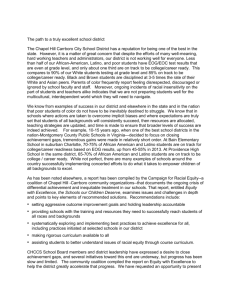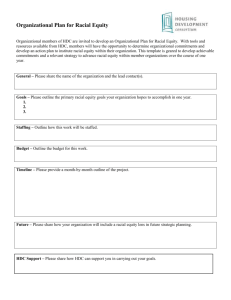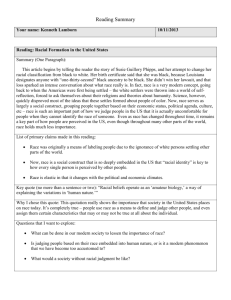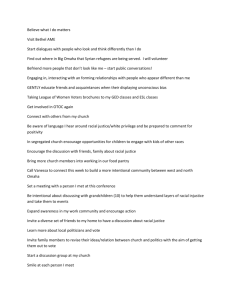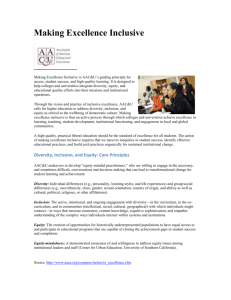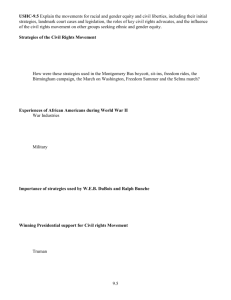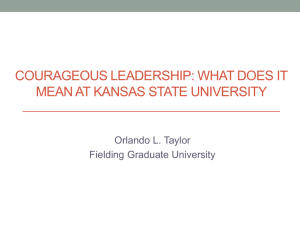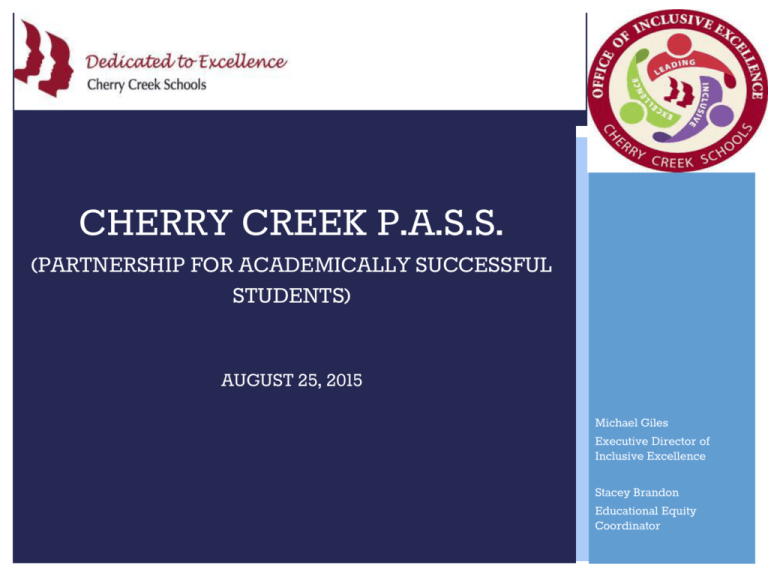
CHERRY CREEK P.A.S.S.
(PARTNERSHIP FOR ACADEMICALLY SUCCESSFUL
STUDENTS)
AUGUST 25, 2015
Michael Giles
Executive Director of
Inclusive Excellence
Stacey Brandon
Educational Equity
Coordinator
AGENDA
◼Welcome!
◼Why Are We Here?
◼Let’s Talk / Let’s Listen / Let’s Relate
◼P.A.S.S. Framework
◼Open Space
WHY ARE WE HERE?
CHERRY CREEK’S COMMITMENT
CCSD COMPREHENSIVE FRAMEWORK
FOR EQUITY
CRE
S,W,C,
K
Inclusive
Excellence
INCLUSIVE EXCELLENCE
◼Access and Opportunity
◼Racial Consciousness
Inclusive
Excellence
◼Cultural Competence
◼Culturally Responsive Education
Culturally Responsive Education
CRE
Dr. Adeyemi Stembridge, PhD.
Systemic Equity Transformation Theory of Action
Skill
Courageous
Conversation
Problem
CAUSE
Passion
Practice
Persisten
ce
Practice
Solution
Implementation
Knowledge
Will
Critical
Race
Theory
Anti-Racist
Leadership
Passion
Practice
Equity is…
Raising the achievement of all
students while;
eliminating the gaps between the
highest and lowest performing
students and;
Capacity
Systems Thinking
Persistence
eliminating the racial predictability
and disproportionality of which
student groups occupy the highest
and lowest achievement categories.
Anti–Racism is…
Our conscious and deliberate, individual
and collective action that challenges the
impact and perpetuation of
© 2006. Pacific Educational Group, Inc. All Rights Reserved.
systemic/institutional White racial
privilege, positioning and power.
5
Courageous Conversation is the utilization of the Four Agreements, Six Conditions and Compass
in order to engage, sustain and deepen interracial dialogue about race, racial identity and institutional racism;
and is an essential foundation for examining schooling and improving student achievement.
Four Agreements
✶ Stay Engaged
✶ Experience Discomfort
✶ Speak Your Truth
✶ Expect/Accept Non-Closure
1
3
THE SIX CONDITIONS
1. Focus on Personal Local and Immediate
1. Isolate Race
1. Normalize the Social Construction & Multiple
Perspectives
1. Monitor the Agreements
1. Use a Working Definition for Race
1. Examine the Presence and Role of “Whiteness”
THE COMPASS
LET’S TALK, LISTEN & RELATE
PASS
Praise
Advocacy
Family
Empowerment
& Community
Engagement
Equitable
Environment
PASS TEAMS
(PARTNERSHIPS FOR
ACADEMICALLY SUCCESSFUL
STUDENTS)
Not everything that is faced can be changed, but
nothing can be changed until it is faced.
- James Baldwin
WHY PASS?
To provide access to parents that have frequently been marginalized by the
traditional methods of parent involvement and engagement in schools.
To provide a space to focus on the racial disparities that exist systemically and
allow parent voice in the room to address issues and solutions.
WHAT IS THE PURPOSE/FUNCTION OF
PASS TEAMS?
Parent Voice
Provide parents access to building leadership for authentic conversations of their
student’s and their own experiences in our system.
Courageous Conversations
Utilizing the Courageous Conversations Protocols, engaging in conversations on
race and it’s impact in respective school communities.
WHAT IS THE PURPOSE/FUNCTION OF
PASS TEAMS?
Examine Racial Achievement Data
Review school achievement and discipline data to gain an understanding of
the racial disparities that exist within their respective school and district
wide
Identify School Resources & Assets
Explore and determine resources and assets that can be used to support and
promote the academic success of students of color.
WHAT IS THE PURPOSE/FUNCTION OF
PASS TEAMS?
Parent/School Partnerships
Recognition that parent/school partnerships are critical relationships for
school equity transformation.
“School-based PASS Team members help the community-based
educators understand the standards by which the children are
measured. The community-based educators help school-based
educators understand the community standards.”
Singleton, Glen. Courageous Conversations About Race
WHO IS ON THE PASS TEAM?
Team Leader - Principal/Building Administration
Parents
School Staff
Community Members
WHEN? HOW?
Within this framework PASS Teams will look, feel, and
operate differently based on the unique composition,
concerns, and strengths of the respective school
community. This will determine how often the PASS team
meets and the way in which they meet.
“Through PASS Teams, students ultimately benefit, as deeper understanding and
greater trust is built between school-based and community-based educators,
leading to authentic support, improved instruction and higher student
achievement.”
Singleton, Glen. Courageous Conversations About Race
TOGETHER WE ACHIEVE EXCELLENCE
Next Meeting: September 30, 2015 @ISF
Performance Improvement Team
Examination of District Data and the District Improvement Plan


